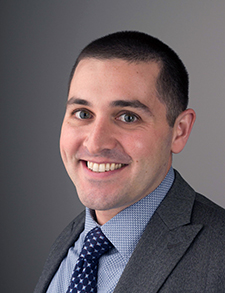Minors requiring guardianship are sometimes hospitalized for much longer than medically necessary because of placement issues. The same can happen for incapacitated adults who require some form of guardianship prior to discharge. Both these scenarios can cause medical and mental health issues for patients, as well as an increased burden on staff, hospitals, and the overall health care system.
Prolonged hospitalizations in minors without guardians

Dr. Webb
Nicole Webb, MD, who is an assistant clinical professor at Stanford University in Stanford, Calif., and a pediatric hospitalist at Valley Children’s Hospital in Madera, Calif., noted a common scenario: A child in a foster placement might have a crisis of their underlying medical problem, like type 2 diabetes, requiring hospitalization, and then their previous foster placement might not reaccept them when they are ready for discharge. Sometimes children with such medical issues are hospitalized for weeks or months between foster placements even if no acute need for hospitalization was ever present (sometimes termed a “social admission”).
Other hospitalized children sometimes need foster placement as well, e.g., if the hospital makes an initial report of abuse to child protective services (CPS) for a toddler. However, most of those children are not prone to extended, unnecessary hospital stays, because it’s usually relatively easy for hospital social work systems to work with CPS and find an appropriate placement.
But placement can be extremely challenging for older children, who may have severe behavioral issues from a long history of trauma and unmet social and mental health needs. These children may fail multiple placements in several different counties because of such issues, which makes them even harder to place in the future.
Dr. Webb said, “Generally teens and people with more medical problems are harder to place, and so they may end up in the hospital for a long time. That is really challenging for these kids, and everyone involved in their care, and it’s a drain on health care resources.” Dr. Webb noted that the strain falls particularly heavily on the bedside nursing staff, but for a hospitalist, addressing questions about such patients often takes considerable time.

Dr. Chen
Nancy Chen, MD, a clinical assistant professor of pediatrics at Banner-University Medical Center in Tucson, Ariz., said her hospital also sometimes has such medically unnecessary prolonged hospitalizations, although they are rare. Here as well, the problem is often children with complex medical issues who are awaiting foster placement through CPS. At Dr. Chen’s hospital they also occasionally treat unaccompanied minors for reasons related to immigration, but this population is promptly released to U.S. Customs and Border Protection or charitable organizations and is not prone to such extended stays.
Dr. Chen said, “While we try our best as hospital staff—and we have a lot of in-house resources for children, like through child life services—it’s still not a normal place for a kid to be.”
Deonna Villegas-McPeters, LCSW, the director of social work at Valley Children’s Hospital, explained that hospitals have become part of the safety net for these children. “But we are not set up to meet all of their mental health needs or their ongoing behavioral health needs. We become a holding ground, and with RSV and flu season, our beds become more of a commodity. When we have a kiddo or two sitting there that doesn’t require medical care, that’s really hard.”
Addressing the root causes of these challenges is extremely difficult for hospitals. Clear and regularly scheduled communication among clinicians, hospital social workers, CPS staff, and other relevant parties may help move the process along, but such diligent outreach is often already in place. Limitations in CPS resources still pose a major obstacle. “The reality is, CPS does not have nearly enough resources for the referrals that they get,” said Dr. Webb.
Certain areas of the country with greater socioeconomic disparities, higher need for foster placements, and fewer resources overall may particularly struggle with this issue. Other local factors can also play a role. Maria Gutierrez, LCSW, a social work manager at Valley Children’s Hospital, pointed out that in California, a 2017 legislative change in the way the state organizes its foster placements in its short-term residential therapeutic programs (STRTPs) has made it even more difficult to get foster placements for medically and behaviorally complex patients, although that was not the law’s intention.
Dr. Chen said, “When we get these kids, we do our best to take care of them and be there for them, but it does make you realize that there are a lot of greater issues [in broader social systems] that we can’t fix.”
Adults who require surrogate decision makers
Adults may also require the establishment of a legal guardian before hospital discharge can take place. For example, this might happen if an adult without a pre-designated health care proxy cannot make informed decisions due to the medical problems that necessitated hospitalization. In this instance, the hospital cannot complete discharge to a long-term care facility until a surrogate decision maker is established.

Dr. Ricotta
Daniel N. Ricotta, MD, is an assistant professor of medicine at Harvard and a hospitalist at Beth Israel Deaconess Medical Center in Boston, Mass. He said, “At any given time in a typical hospital, we might have 10-20 people awaiting guardianship. That’s 10-20 beds you could be using for someone else who needs them.” He said, “The increased length of stay reduces throughput to the hospital, so you have a backlog of patients who are waiting for beds.”
States vary in their surrogate-consent laws, in terms of the ease with which surrogates (such as a family member) can step in and make various specific decisions. Some states, including Massachusetts, have no surrogate-consent laws. In this case, the person wanting to be a surrogate must complete extensive guardianship documentation, notify all relevant parties, and get official guardianship bestowed at a court date—all steps in which mistakes might be made, causing delays.1
Dr. Ricotta said, “Part of the reason that the guardianship process takes so long, especially in Massachusetts, is that courts … don’t meet often enough to review the cases in a timely manner.” He noted that at his institution they make efforts to identify such potential patients early, to start this process as soon as possible, and help prevent these delays.
The process can be even longer and more involved for patients who have no family members or friends to step in. In these cases, it may fall primarily to the hospital’s in-house legal counsel to take steps to establish a formal guardianship, working through the courts.
Most states have public-guardianship programs that can help match appropriate guardians to patients in these cases. But some states, such as Massachusetts, have no such programs. This leaves even more work for hospitals trying to establish professional or volunteer guardians for these patients. In Massachusetts, a bill to enact a public guardianship has come before the state legislature, but it has not been passed yet.
Dr. Ricotta and colleagues studied this issue at his institution and found, accounting for potential confounders, that the process of obtaining guardianship was associated with a 37% longer total length of stay and 23% higher total charges.2 Perhaps even more importantly, one in six such patients awaiting guardianship experienced a hospital-related complication (such as hospital-acquired pneumonia) after having been medically ready for discharge.2
Because the legal pursuit of guardianship via the courts can be necessary even when a patient has a willing family member or friend, encouraging able adults to establish their own official health care proxies is key. Dr. Ricotta said, “The biggest and most important strategy is the push to get health care proxies completed by all of our patients in our network as a quality-improvement initiative.”
References
Langlois WO, Yacovone D. Improving the guardianship process: Better for patients and better for hospitals. Boston Medical Health Center. HealthCity website. healthcity.bmc.org/policy-and-industry/guardianship-process-change-better-patients-and-hospitals. May 13, 2019. Accessed January 3. 2022.
Ricotta DN et al. The burden of guardianship: A matched cohort study. J Hosp Med. 2018;13(9):595-601.
Ruth Jessen Hickman, MD, is a graduate of the Indiana University School of Medicine. She is a freelance medical writer living in Bloomington, Ind.